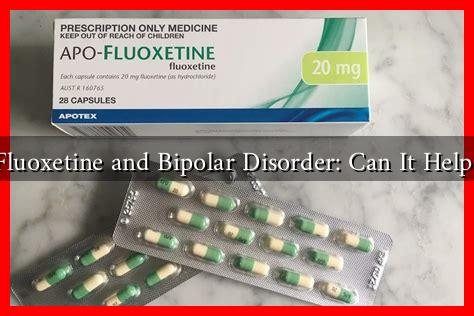-
Table of Contents
Fluoxetine and Bipolar Disorder: Can It Help?
Bipolar disorder is a complex mental health condition characterized by extreme mood swings, including emotional highs (mania or hypomania) and lows (depression). Treatment often involves a combination of medications and psychotherapy. One medication that has garnered attention in the context of bipolar disorder is fluoxetine, a selective serotonin reuptake inhibitor (SSRI) commonly used to treat depression. This article explores the potential benefits and risks of using fluoxetine in individuals with bipolar disorder.
Understanding Fluoxetine
Fluoxetine, marketed under the brand name Prozac, is primarily prescribed for major depressive disorder, obsessive-compulsive disorder, and panic disorder. It works by increasing the levels of serotonin in the brain, which can help improve mood and emotional stability. However, its use in bipolar disorder is more controversial.
The Bipolar Disorder Dilemma
Bipolar disorder is typically treated with mood stabilizers, such as lithium or valproate, and atypical antipsychotics. The challenge arises when patients experience depressive episodes, as traditional antidepressants can sometimes trigger manic episodes in those with bipolar disorder. This phenomenon is known as “antidepressant-induced mania.”
Fluoxetine’s Role in Bipolar Disorder
Research on the use of fluoxetine in bipolar disorder has produced mixed results. Some studies suggest that fluoxetine can be effective in treating depressive episodes without significantly increasing the risk of mania. However, caution is advised, and it is often recommended to use fluoxetine in conjunction with a mood stabilizer.
Case Studies and Research Findings
- A study published in the Journal of Clinical Psychiatry found that fluoxetine, when combined with olanzapine (an atypical antipsychotic), was effective in treating depressive episodes in patients with bipolar I disorder.
- Another research article in Bipolar Disorders indicated that fluoxetine could be safely used in patients with bipolar disorder who were already stabilized on mood stabilizers, showing a reduction in depressive symptoms without triggering mania.
Benefits of Fluoxetine in Bipolar Disorder
Fluoxetine may offer several benefits for individuals with bipolar disorder, particularly during depressive episodes:
- Improved Mood: Fluoxetine can help alleviate symptoms of depression, leading to improved overall mood and functioning.
- Lower Risk of Mania: When used alongside mood stabilizers, fluoxetine may have a lower risk of inducing mania compared to other antidepressants.
- Accessibility: As a widely prescribed medication, fluoxetine is often more accessible and familiar to both patients and healthcare providers.
Risks and Considerations
Despite its potential benefits, there are risks associated with using fluoxetine in bipolar disorder:
- Manic Episodes: There is still a risk that fluoxetine can trigger manic episodes, especially if not used in conjunction with a mood stabilizer.
- Side Effects: Common side effects of fluoxetine include nausea, insomnia, and sexual dysfunction, which can impact adherence to treatment.
- Individual Variability: Each patient’s response to fluoxetine can vary, necessitating careful monitoring by healthcare providers.
Conclusion
Fluoxetine can be a valuable tool in the treatment of bipolar disorder, particularly for managing depressive episodes. However, its use must be approached with caution, ideally in combination with mood stabilizers to mitigate the risk of triggering mania. Ongoing research and clinical experience will continue to shape our understanding of fluoxetine’s role in bipolar disorder treatment. Patients should work closely with their healthcare providers to develop a personalized treatment plan that considers their unique symptoms and history.
In summary, while fluoxetine may help some individuals with bipolar disorder, it is essential to weigh the benefits against the risks and to monitor treatment closely. As with any mental health condition, a comprehensive approach that includes therapy and lifestyle changes is crucial for effective management.

